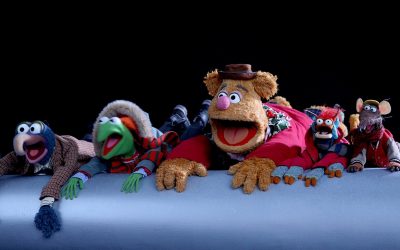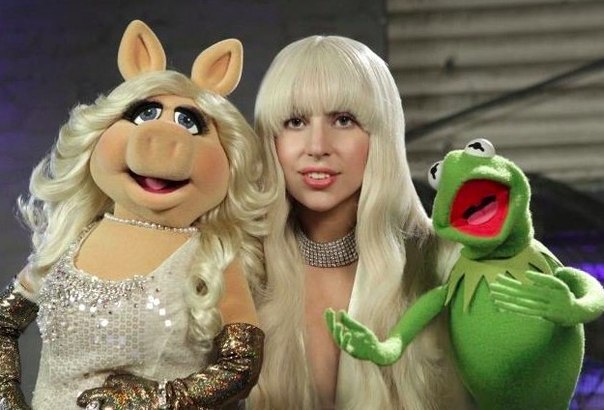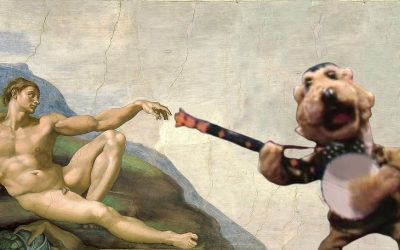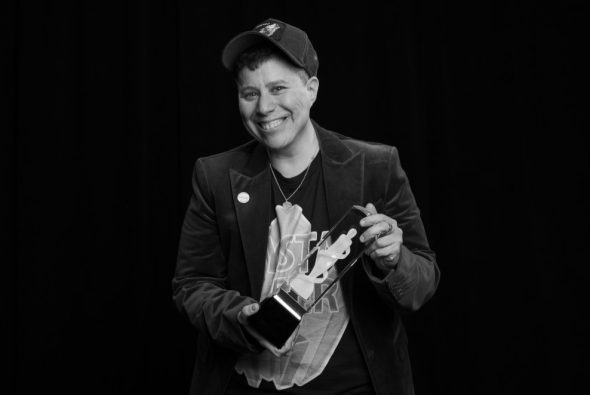
For this Pride Month at ToughPigs, we’re reminding you again that transgender and nonbinary people are just people in your neighborhood like everyone else. We’re not evil or weird, or even new, despite what a lot of people want you to think. We’ve always been here, living our lives, hanging out with our friends, and sometimes, making the art you love.
Case in point: The Henson Company and Disney have worked with a number of trans and nonbinary puppeteers and performers over the years. They’re a part of shows you enjoy, like Muppets Mayhem and Back to the Rock. So for Pride Month, I reached out to some of them and had amazing conversations with some of the most genuine, passionate artists I’ve ever spoken to. Below, I’m going to profile one of them and share some stories. Stay tuned this month for more profiles!
Ali J. Eisner (they/them)
Henson Projects: Back to the Rock
The Beginning:
When I conducted the other interviews for this month’s Pride Month Profiles, so many people told me how essential it was that I take time to chat with Ali J. Eisner. Ali is famous in the puppetry community for being a positive and supportive force for all sorts of queer people, and I was so excited to sit down and speak to them.
Ali is a trans/non-binary puppeteer who has identified as queer since they were 21 years old. About nine years ago, when they were 40 years old, they came out as non-binary. Ali has been working on children’s entertainment for 27 years now, and was a key part of Fraggle Rock: Back to the Rock. On that show, they played Cotterpin’s pal Turbo Doozer, Balsam the Troubadour, Coop, a variety of Gaggle Fraggles, and Inkspots. They also puppeteered Jack Hammer, the Doozer whose voice was provided by Keenan Thompson. And most importantly, Ali assisted Karen Prell with Red Fraggle, serving as Karen’s assistant and double.
Since they were very young, Ali wanted to work in puppetry, in part because of their love for the works of Jim Henson. “I had very loving parents, and watching Jim Henson shows created a third parent vibe – a very safe space for me. I felt like I just belonged when I watched his programs. I felt so excited to get lost in them. It was just a big cast of weirdos, and I was a weirdo – and all these weirdos I was watching were happy and so confident in who they were – and that gave me more confidence to be myself.”
They add, “On Jim’s shows, there is no binary. There’s no set fixed way that anyone has to look, or be.
It created such an accepting and safe place for me growing up, and Jim made me want to be a puppeteer.”
Ali went to acting school, then began working as an on-camera actor when they were 21. They became an on-air host on Canadian children’s channel YTV. Ali recounts their experiences, saying, “I was trying reeeaaally hard to be a straight girl, and I just wasn’t one. But I still had the time of my life. I really cut my teeth at YTV, learning how to connect with audiences, kids, guests, and puppets.” Ali remembers that one of the best things about their time on YTV was having the opportunity to befriend their on-camera puppeteers. “Because at the time I didn’t feel comfortable in my own body, I spent more time in the puppeteers hang out room, wanting to express myself through puppets. The guys there were amazing, and taught me about things like using monitors, performance, and puppet building.”
As a result, in time Ali would begin doing even more puppetry work. They began working with Canadian puppetry group The Grogs, and did shows like Nanalan, Mr. Meaty, and Ooh and Aah. Ali worked for 14 years on TV Ontario on Gisele’s Big Backyard, where they wrote, creative produced, and puppeteered a blue bird character, named Jay. Ali says that Jay was originally written as a girl, but over time the show’s audience conceptualized Jay as non-binary as well.
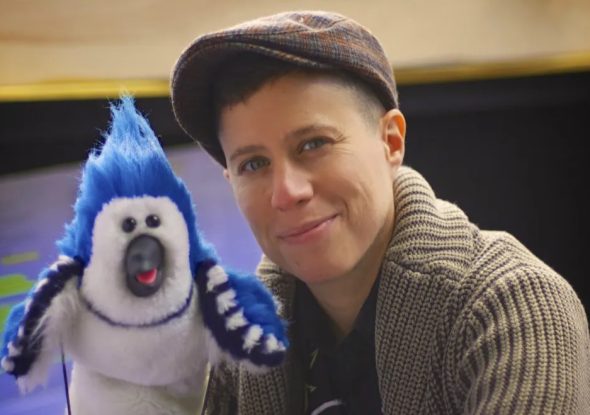
Ali’s other credits from this era were playing a fancy yam lady named Mamma Yamma on Kids CBC and working for Sprout on NBC. At Sprout, Ali directed, wrote, produced on a variety of programs and performed a singing dog named Banjo on the Let’s Go Show.
Other than Back to the Rock, Ali says that the best role they’ve had recently was playing a non-binary singing fairy (oddly enough, also named Jae) on Peacock’s TV show Supernatural Academy.
Henson and Back to the Rock:
Before Season 1 of Back to the Rock, Ali was contacted by Jason Hopley (another queer Henson associate). Jason asked if Ali would be interested in joining the production, and Ali was overwhelmed just to get the offer. They laughed, explaining “It was like a dream come true to get that call.”
Ali auditioned for the Henson Company, reading for a few characters, trying out new voices, and of course, openly stating their pronouns. When they got a call saying they got a role on Back to the Rock, they were shocked. “I felt like I was in a dream state. I honestly couldn’t see properly – I had to sit down!”
During the auditions, Ali really connected with Turbo Doozer, and was thrilled when Johnny contacted them to let them know they were cast to play the part. Turbo was conceived as a female Doozer, but when Ali started playing Turbo, a funny thing happened. Ali found that the crew and fans both started referring to Turbo using a variety of pronouns: “he,” “they,” or sometimes “she.” Ali sees that as something positive, and truly enjoys that people can’t quite put their finger on Turbo’s gender.
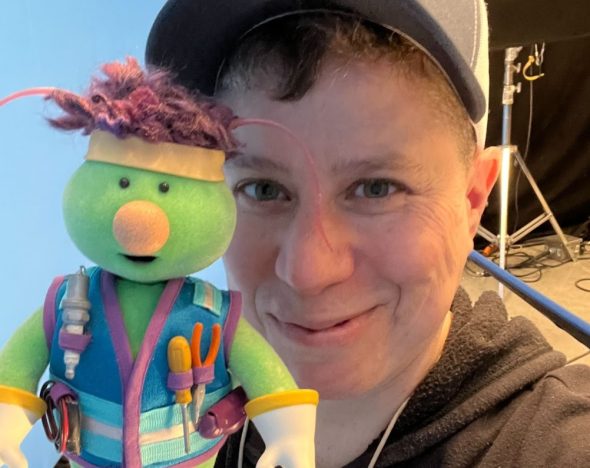
Ali says that kids don’t have a hard time understanding non-binary people or characters. “Kids just care if you’re funny, cool or nice. They don’t care what your gender is.”
Ali also remembers playing Balsam the Troubadour quite fondly. Balsam, the buglike drummer of the Troubadours, is actually the original puppet used in the 80s. While a lot of work had to be done to repair the deteriorating puppet, it is still largely the same as it was: much bigger and heavier than most modern puppets. Ali voiced Balsam and puppeteered them with the assistance of Jamie Konchack.
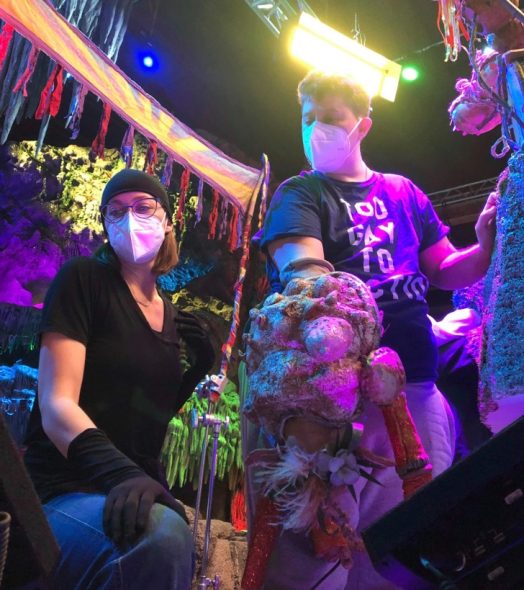
While Ali did not voice Jack Hammer, they really enjoyed puppeteering him, especially because Ali also rides a motorcycle. Really, Ali enjoyed playing whatever character they were asked to. They mention that John Tartaglia is a generous and thoughtful leader, and always wanted to make sure that everyone had a chance to shine with screen time and jokes, so every role was always so much fun to play.
People like John Tartaglia (himself a gay man) made the Fraggle set an incredibly accepting place for Ali. There were so many queer folks around, and many allies.
Ali says, “I’ve never worked with so many queer people, so many women, so many people of color… It’s also so nice to not be the only non-binary person for once!”
“It was incredible,” they add, thinking back to the early Zoom meetings before Back to the Rock taping began. “I let people know my pronouns, and then I got a call from the third assistant director an hour later. He was like ‘Hey, so…we just caught wind you’re trans and non-binary, so we just wanted to make sure your bathroom situation was ok…’ The assistant director just wanted to make sure that when I got to set, I was comfortable. That was unheard of to me. It was a first.”
Ali mentions an early read-through of the episode “The Glow,” with every queer person in the room being teary eyed. They credit that to the amazing writing of Sabrina Jalees, another queer Canadian artist working on Back to the Rock.
Thinking about the rest of the cast and crew, Ali smiles. “You know who’s incredible with pronouns? Karen Prell. She never misses a beat.”
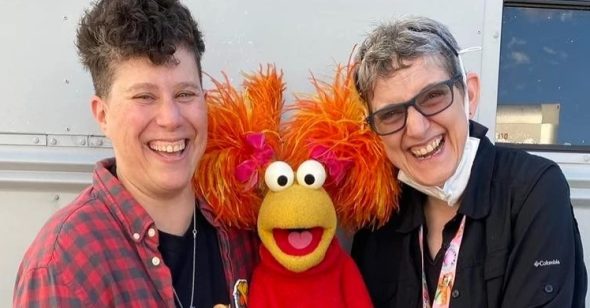
Other Work: As mentioned, Ali has had their hand in many different children’s programs. In addition to puppetry, Ali composes music, writes scripts and show bibles, directs and also loves photography. Recently, Ali began combining these many interests into independently directing music videos for Canadian musicians. In 2019, Ali made a puppet-based music video for the Bahamas song “No Depression,” and was proud to win a Juno Award for their efforts. Their most recent video was “Little Frogs” for the Canadian musician, Sarah Harmer.
Final Thoughts: I asked Ali for their thoughts about the ways queerness intersects with the world of puppetry. Ali says, “For many years, when I was a physical person on air, it was difficult. I was always told I was too heavy or too short or too this or too that…
“When I became a puppeteer and started moving away from on-air hosting, there was a bit of relief.
Being a puppeteer, I don’t have to be judged for the way I look. As a trans/non-binary person, that can relieve a whole lot of struggle. As a puppeteer, I can make jokes and make people happy and not have to worry about what people think of my appearance.
“I actually might be on camera as myself again soon, and I’m excited, because now I feel totally comfortable with my appearance and gender identity. When you’re a puppeteer, it’s only about what’s in your heart, not at all what you look like. When you look at really old photos from the Henson days, and you see photos of the puppeteers with puppets and it’s like, ‘that’s who played that character!?’ I love how wide the role pool is for puppeteers.”
Connecting to this, they note that the main beauty of Henson’s work has always been celebrating everyone’s uniqueness and difference. They say that audiences need to remember this too.
“Please keep an open mind. As long as you try to keep learning and listening, that’s all we need.”
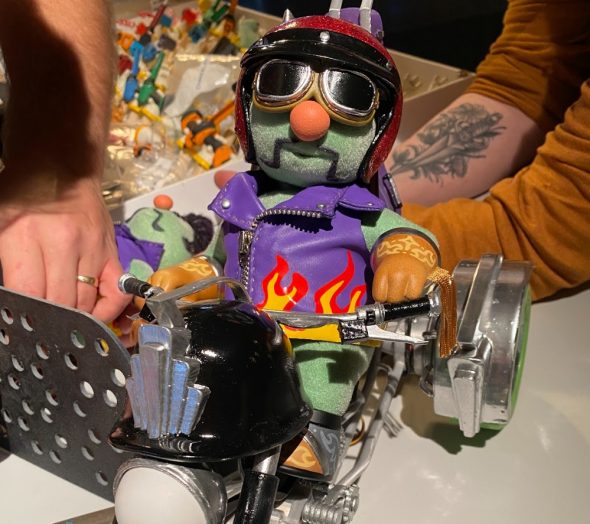
Click here to agree Karen Prell is the best on the ToughPigs forum!
By Becca Petunia

